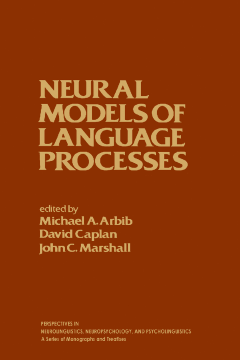
Additional Information
Book Details
Abstract
Neural Models of Language Processes offers an interdisciplinary approach to understanding the nature of human language and the means whereby we use it.
The book is organized into five parts. Part I provides an opening framework that addresses three tasks: to place neurolinguistics in current perspective; to provide two case studies of aphasia; and to discuss the ""rules of the game"" of the various disciplines that contribute to this volume. Part II on artificial intelligence (AI) and processing models discusses the contribution of AI to neurolinguistics. The chapters in this section introduce three AI systems for language perception: the HWIM and HEARSAY systems that proceed from an acoustic input to a semantic interpretation of the utterance it represents, and Marcus9 system for parsing sentences presented in text. Studying these systems demonstrates the virtues of implemented or implementable models.
Part III on linguistic and psycholinguistic perspectives includes studies such as nonaphasic language behavior and the linguistics and psycholinguistics of sign language. Part IV examines neurological perspectives such as the neuropathological basis of Broca's aphasia and the simulation of speech production without a computer. Part V on neuroscience and brain theory includes studies such as the histology, architectonics, and asymmetry of language areas; hierarchy and evolution in neurolinguistics; and perceptual-motor processes and the neural basis of language.
